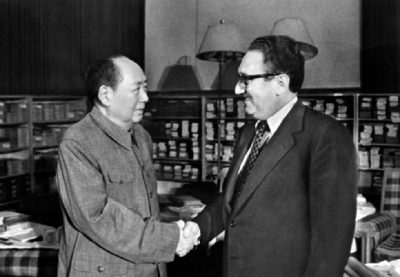US Strategists Should Consider Kissinger’s Wise Advice About China
Kissinger is correct in assessing that the grand strategic trajectory is dangerously moving towards a “World War I-type situation”, but it’s not too late to stop it.

All Global Research articles can be read in 51 languages by activating the “Translate Website” drop down menu on the top banner of our home page (Desktop version).
To receive Global Research’s Daily Newsletter (selected articles), click here.
Visit and follow us on Instagram, Twitter and Facebook. Feel free to repost and share widely Global Research articles.
***
Former US Secretary of State and National Security Advisor Henry Kissinger, who’s globally renowned for his realpolitik during the Old Cold War, strongly advised his country not to let Taiwan become the core of its relations with China. He warned that doing so risks a “World War I-type situation … where people slide into a conflict.” His wisdom about this issue of global concern should be seriously considered by US strategists, especially in the aftermath of US President Joe Biden’s provocative comments.
The American leader said during a press conference that his country will get involved militarily if China is resorts to forceful means for reunifying with Taiwan. The White House later walked back the same comments that the president spent a couple sentences elaborating on but the damage was already done. The US’ so-called “strategic ambiguity” towards that scenario, which was already in and of itself a violation of its One China policy, has now been clarified from the perspective of many observers.
In the event of a military conflict between those two parts of the People’s Republic, the US will most likely replicate the Ukrainian model of waging a proxy war on that major country via the emergency dispatch of unprecedented amounts of military, financial, and other forms of aid. Put another way, one can conceptualize the NATO-led proxy war on Russia through Ukraine as being the testing ground for waging an AUKUS-led proxy war on China through its Taiwan region sometime in the future.
Chairman of the Joint Chiefs of Staff General Mark Milley told West Point graduates over the weekend that they must prepare for countering what he claimed were China’s attempts to change the post-World War II international order. Biden’s first trip to the Republic of Korea and Japan as president is meant to solidify the US’ existing treaty alliances in Northeast Asia in possible preparation of the scenario that he scandalously discussed.
All of this very strongly suggests that a disaster of epic proportions is slowly in the making, one which many feel powerless to stop since it appears as though the grand strategic inertia is irreversibly moving in that direction. That’s why Kissinger’s wise comments are so important for US strategists to pay attention to. It’s only by preventing Taiwan from becoming the core of Chinese-American relations can the worst-case scenario of those two clashing over that region possibly be averted.
The US cannot claim to support a so-called “rules-based order” when it’s de facto violating its own One China policy and going against its official recognition of Taiwan as an integral part of the People’s Republic. America’s facilitation of approximately $20 billion in arms sales to Taiwan since 2017, as revealed by US Secretary of State Antony Blinken during his testimony before the Senate late last month, shows that the Pentagon is preparing for a proxy war against China exactly as Biden hinted.
This is occurring in parallel with Japan’s increasingly destabilizing role in the Asia-Pacific as a result of its illegal militarization in contravention of that country’s pacifist constitution that’s being carried out under the unconvincing pretext of bolstering its so-called “Self-Defense Forces”. Coupled with AUKUS, it’s clear that America is creating an “Asian NATO” whose undeclared purpose is to “contain” China and most likely militarily support Taiwan in the event of a future conflict between those two.
Kissinger is correct in assessing that the grand strategic trajectory is dangerously moving towards a “World War I-type situation”, but it’s not too late to stop it. The American economy is being crushed by a combination of the consequences stemming from the COVID-19 pandemic, Biden’s disastrous policies, and blowback from the US-led West’s unprecedented sanctions against Russia. The US objectively has a much more pressing interest in refocusing its efforts towards the home front than against China.
“Containing” China only generates profits for the US’ powerful military-industrial complex within which many political figures are speculated to have invested. It doesn’t benefit the American people, those in the Asia-Pacific, nor anyone across the world for that matter. To the contrary, it risks sparking another world war by miscalculation exactly as Kissinger fears. The first step towards preemptively averting that worst-case scenario is for the US to return to sincerely practicing its One China policy.
This entails suspending arms shipments to the island and associated training of its forces as well as no longer agitating for Taiwan to be treated separately from China at international fora like the World Health Organization (WHO). Those steps would signal to Beijing that Washington is sincere in avoiding a conflict with it over that region. Only then can those two return to talks for improving their troubled relations and exploring opportunities for mutually beneficial cooperation that would stabilize the world.
*
Note to readers: Please click the share buttons above or below. Follow us on Instagram, Twitter and Facebook. Feel free to repost and share widely Global Research articles.
This article was originally published on OneWorld.

